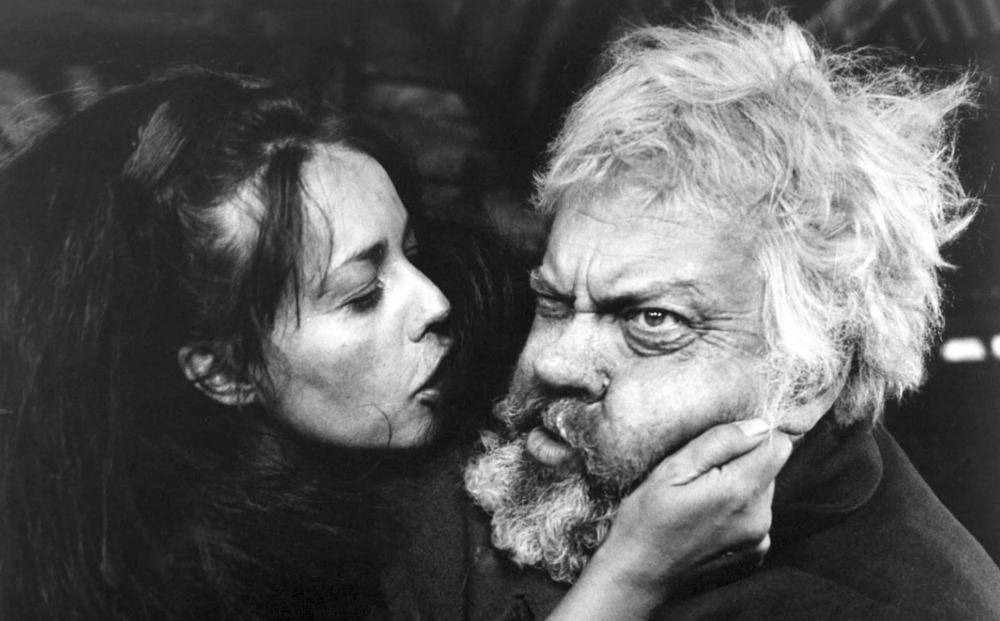CHIMES AT MIDNIGHT
Sunday, March 12
1:10
Tuesday, March 14
1:00 6:00
Directed by Orson Welles
Spain/Switzerland, 1966
Starring Orson Welles, Keith Baxter, John Gielgud, Margaret Rutherford, Jeanne Moreau
Approx. 115 min. DCP
“Oh Sir John, the times that we have seen!” laments Alan Webb’s doddering Justice Shallow in Welles’ dream of four decades (his cobbling together of four of the history plays, Five Kings, sank his celebrated Mercury Theater in 1938), his final — and arguably greatest — Shakespearean adaptation: a wintry lament for the “death of Merrie England” with Welles’ “plump Jack Falstaff” — a part that, over the years, he grew into — as the force of love and life versus the icily ruthless Prince Hal of Keith Baxter, with John Gielgud’s King Henry IV the moral center. Shot almost completely throughout with an extremely wide angle lens for a depth of focus seemingly approaching 3D, CHIMES boasts some of Welles’ most grandiose imagery: Gielgud perched on his throne in some of the emptiest and draftiest castles ever filmed; Margaret Rutherford, Jeanne Moreau and Welles’ daughter Beatrice highlighted among teeming tavern scenes; Welles kneeling among a forest of spears, and hoisted, fully armored, atop a terrified horse; climaxing with one of the greatest battle scenes ever put on film.
Reviews
“A CINEMATIC EVENT OF THE FIRST ORDER!”
– Richard Brody, The New Yorker
“BURSTING WITH LYRICISM AND EMOTION! Welles choreographs both his actors and his camera with a flow and an esprit that few contemporary directors can match . The Eastcheap tavern comes off as dizzyingly serpentine—a labyrinthine adult’s-only playhouse—as Hal tumbles in and out of its corridors and crannies to surprise and torment Falstaff. The lighting throughout is resonant and evocative: the sun enters the vaulted palace of the God-conscious King in eerie clerestory beams. The editing is bold and fluid."
– Michael Sragow, Film Comment
“Decked out with scruffy hair, a cantilevered beard, crusty eyes and a crafty smile, and deploying a tuba-register voice that shakes the timbers of the Boar’s Head Inn, WELLES GIVES A PERFORMANCE THAT’S MONUMENTAL IN GIRTH AND IMMENSE IN DRAMATIC PRESENCE!
– Joe Morgenstern, The Wall Street Journal
“One of the very pinnacles of Welles’s art, matching a forceful, visual dynamism to melting, mellifluous reading of Shakespeare’s text. Welles’ Falstaff is more convincingly young than Charles Foster Kane ever was old, combining Welles’s boyish, twinkling insouciance with the heft of accumulated years.”
– Nick Pinkerton, Artforum
“REMARKABLE! Every shot is packed with meaning or purpose; Edmond Richard's cinematography makes the most of sumptuous Art Deco shards of light and highlights the soft fold of royal vestments just so. The performances are just as regal: An effortlessly intimidating John Gielgud plays Henry IV, Hal's disapproving dad. Jeanne Moreau appears as the amorous prostitute Doll Tearsheet, and Margaret Rutherford is the bustling Mistress Quickly — she delivers that famously erotic elegy for her dear Falstaff, a walking libido of a man, with shivery-exquisite tenderness.”
– Stephanie Zacharek, Village Voice
“A FILM TO TREASURE!”
– Roger Ebert
“WELLES’ MASTERPIECE!”
– Joseph McBride
“Not an ad hoc project but the result of a lifetime of scholarship and creative experiment.”
– Pauline Kael
“Restrained and even serene (down to its memorably muddy battle scene), it shows Welles working largely without his technical flourishes—and for those who have never seen beyond his surface flash, it is ample proof of how sensitive and subtle an artist he was.”
– David Kehr
“WELLES’ MOST HUMAN FILM, HIS MOST POIGNANT, FUNNY AND EMPATHETIC! Anyone who buys the lazy lie that Welles’s talent nosedived along with his career in the wake of The Magnificent Ambersons needs to watch this… One of the best screen adaptations of Shakespeare, which is ironic, because it’s also one of the most irreverent. It’s hard to imagine a more perfect and timely meeting of artist and character: at the time Welles was an outcast from Hollywood, better known as a raconteur and ham-for-hire than a creative force…. Strange and entrancing, at times dreamlike and distant, at others brutally realistic… Gorgeously, heartbreakingly sad, shot through with romantic surrender and the ache of loss.”
– Tom Huddleston, Time Out (London)

